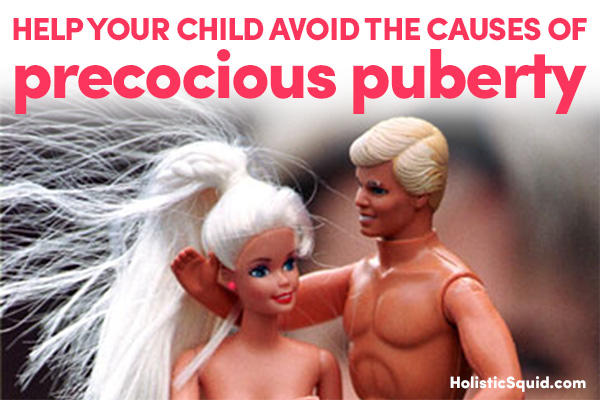
Years ago, kids didn't hit puberty until they were in their teens. A century ago, many girls didn't start getting their periods until age 15, 16, or even 17.
Gradually, this age has declined. A 1997 study (see Pediatrics 1997; 99:505) showed the average age of puberty in girls to be approximately 9 years of age.
Because of studies such as this one, the American Academy of Pediatrics (AAP) has been lowering the age that officially defines “precocious puberty.”
Regardless of what is technically considered early, the facts are that both boys and girls are reaching puberty at younger and younger ages, which raises their risk for health issues later in life including type 2 diabetes, metabolic syndrome/ heart disease, fertility issues, breast cancer in women and testicular cancer in men.
Luckily, parents can use preventative measures to avoid the major culprits known to lead to early puberty. Lifestyle habits including diet and exercise as well as exposure to toxins and hormones have a big impact on healthy puberty ages for kids.
Seven steps to avoiding early puberty
#1 – Get fit
Encourage your children to eat healthy and exercise regularly by setting a good example, preparing food, and getting active with them.
Excess body fat causes the body to produce excess estrogen, and this can lead to early breast development in girls and hormone imbalance in boys.
#2 – Steer kids clear of hormones and pesticides
Serve only good quality meat and dairy products from pasture raised animals, and organic fruits and vegetables whenever possible. The hormones and pesticides in non-organic animal food sources can mimic estrogen in the body.
#3 – Chuck the soy products
Even organic soy acts as a plant-estrogen that interferes with the body's natural hormones. If your family is vegetarian, eat soy only occasionally and find other sources of protein. Soy formula should absolutely be avoided for babies.
#4 – Avoid toxins
Many plastics, personal care products, suntan lotions and drugs that contain hormone-mimicking chemicals including:
- Octyldimethyl – PABA (OD-PABA)
- Benzophenone-3 (BP-3)
- Bisphenol A
- Homo salate (HMS)
- Octyl – methoxycinnamate (OMC)
- 4-methylbenzylidene camphor (4-MBC)
#5 – Use filtered water
Filtered drinking and cooking water helps to detoxify the body and avoids exposure to chemicals. BPA is a toxin that is present in plastic water bottles that is known to contribute to early puberty. Urban water should be tested regularly if you drink it unfiltered in your home. Where to find the right water filter for every need and budget
#6 – Chill Out
Last but not least, stress has proven to be a huge contributor to early puberty. Anthropological studies have tracked early menses in girls and higher domestic stress levels, seeming to prove that the female body knows that when a girl would begin menses (at least in old times), she would be married off–her biological ‘exit strategy' from a stressful home environment. In modern times, it's still wise to help your kids' to reduce stress.
Dealing with early puberty
If your child has started puberty early despite all your best efforts, don't be too alarmed.
For some children, puberty at a young age can be genetic or otherwise normal. Discuss the changes he or she may be experiencing from a place of openness and compassion.
Be sure to continue to follow the guidelines above, and by all means, embrace your child's transition into adolescence. A small celebration, a meaningful gift, or a thoughtful letter will help to make this rite of passage a special one at any age.
Have you taken steps to help your kids avoid known causes of precocious puberty?



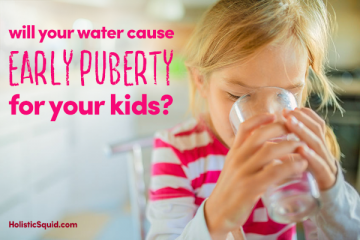
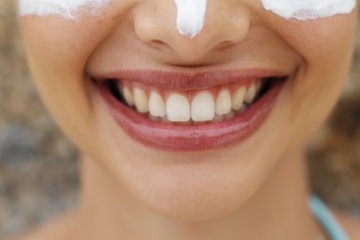



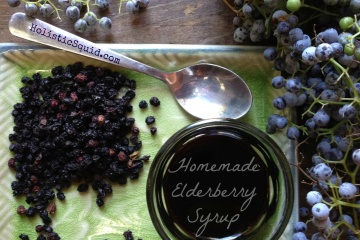
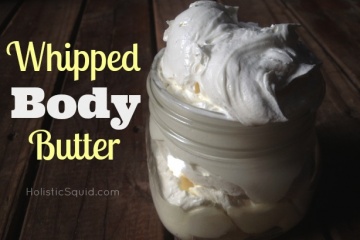

I love this post and agree with everything you have advised. Soy has many nasty side effects & has just been proven to actually accelerate the aging process causing telomers to shorten more rapidly. The skin is the largest organ and we are what we absorb. After years of research I am of the opinion that personal care in the USA specifically is the culprit for at least 60% of our toxicity & infertility. In 1950 testosterone in men was – 100,000 per ml… in .2010 it was only – 5,000 per ml.! Buying 100% toxin free products packaged in neutral plastics, glass, etc is the only way to go for my family and yours! Thanks for this great post.
Thanks, Dani! 🙂
Interesting!
Awesome work!!
Fluoride in our drinking water is also associated with early onset puberty..check this out http://www.prnewswire.com/news-releases/fluoride-could-be-contributing-to-early-puberty-studies-show-100545174.html
Thank you for this I have 4 girls and I worry about this all the time…..I was 11 and even had girls in my class who hit it b/f me……makes me wonder what I was eating but now with raw milk an avoiding plastic ect I hope to save my girls from that whole drama
i agree. I am the mother of 5 and when our oldest daughter was 10 1/2 he began her cycles. here she is at 13 and looks like a grown woman :(. our 10 yr old son is in puberty as well, and just last week I noticed black under arm hair on our second daughter who is 9. I was NOT prepared for this at all! they were all exposed to allot of junk food, fluoridated water, antibiotics ect BEFORE I began making changes a few yrs ago. No one one either side of mine or my husbands family ha entered puberty this early. it stinks!
Thank you so much for sharing your experience with us, Dawn. This truly is awful!